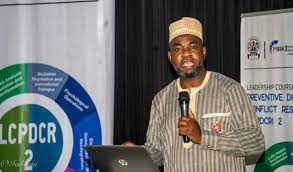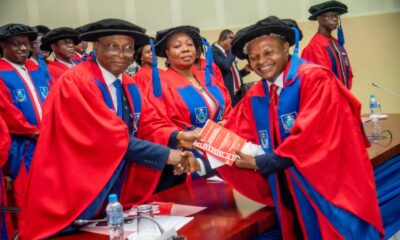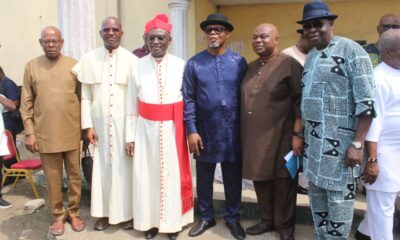Politics
Perspective On NASS 2% Budget Spending

The theme of the symposium was “Saving A Nation From The Precipice: Between Re-Federation And Secessionalism”. The occasion was the 10th annual symposium of the Muslim Students Society of Nigeria, B-Zone. The event which took place last week held in the Ogun State Capital, Abeokuta.
Vice Chancellor of Ahman Pategi University, Patigi, Kwara State, Professor Mahfouz Adedimeji, was the guest lecturer. Top among the dignitaries that graced the talkshop was the Deputy Chairman of Nigeria’s National Assembly and Speaker of the House of Representatives, Rt. Hon. Femi Gbajabiamila by proxy.
Of course, the crux of the discussion was how best to pull back Nigeria that many believe is lingering precariously on the brink of national suicide. And this was where the second in command of the national legislature squared up with the erudite academic as the professor dared to point at the National Assembly as part of the areas that need adjustment in order to save the life of the nation.
In his presentation, Prof. Adedimeji chided the country for running the most expensive legislative arm in the world and expressed the view that a leaner and more concise National Assembly would reduce cost and conserve funds for other critical sectors of the economy that would be of more direct benefit to the generality of Nigerians.
He said, “With due respect to the Speaker of the House of Representatives, Nigeria spends the highest amount of money on legislators in the world and the National Assembly consumes more money than any other parliament in the world”.
According to the university don, it is superfluous to keep two legislative chambers, adding that it is as well bogus and extravagant to maintain the number of lawmakers when a single chamber and a much less number of persons could deliver the same service at a more tolerable cost.
“A unicameral legislature with two representatives from each state is sufficient. The National Assembly should have less than 100 members, including Abuja,” he emphasised.
This inclusion of the National Assembly among the areas to be pruned for better national productivity was what the Speaker of the House, who was also the chairman of the occasion, represented by Hon. Ibrahim Isiaka, House member representing Ifo/Ewekoro Federal Constituency, could not let slide without an effort to put the records straight.
The speaker accused Nigerians of being seemly obsessed with the neglible portion of the national revenue spent on the federal lawmakers while closing their eyes to how the greater part is dispensed.
Gbajabiamila said, while only two per cent of the national budget is spent on the National Assembly, 98 per cent goes to service the rest of the country and wondered why the searchlight is scarcely turned on the greater part instead of beaming its rays always on the infinitesimal fraction.
“The money being spent on the National Assembly is less than two percent of the total budget of this country but nobody has ever looked at what is happening to the remaining 98 per cent”, he said, explaining that, “when you say National Assembly, you are not talking about legislators, who are the lawmakers only. You are also talking about the National Assembly Commission; you are talking about everything, all encompassing”.
While noting that Nigerians appear to lack adequate appreciation of the volume and value of the work of the lawmakers, he called for a change of perception that suggests that the country maintains the most expensive lawmaking arm in the world.
“No one, till today, has actually sat down to go into research and define the meaning of legislators,” he said.
The issue of the cost of maintenance of Nigeria’s legislature is always a touchy one, especially for the lawmakers. The total take home per month for federal lawmakers in the country is still largely a subject of speculation.
Senators and members of the House of Representatives are believed to be carting home double digit millions of Naira as monthly pay packets. While the lawmakers are usually edgy and dodgy whenever any discussion gets close to their emoluments, they also usually shy away from full disclosure.
However, the former Senator representing Kaduna Central Senatorial District, Professor Mahfouz Adedimeji,troubled the waters when he revealed in 2018 that he and his colleagues received N13.5 million as “running cost” in addition to N700,000 consolidated salary and allowances on a monthly basis.
According to the outspoken former lawmaker, the average legislator in the upper chamber of the National Assembly pocketed N162 million yearly in allowances and N9 million in salaries.
Until 2015, statutory budget allocation to the National Assembly was N150 billion annually. The figure was adjusted to N125 billion subsequently, until 2021 when it was moved up to N134 billion.
Without a doubt, two per cent of N13.58 trillion is more than N200 billion. So, going by Gbajabiamila’s submission, money that is expected to go into the running of the National Assembly in 2021 is more than has been made public under the subhead in the appropriation document.
Instead of speaking in percentages, therefore, Nigerians would have loved the speaker to speak in terms of the quantum of money that is being spent on the maintenance of the 469 lawmakers and a service commission whose staff strength may not be more than a thousand persons.
This, actually, is the point of divergence between Prof. Adedimeji’s argument and the Honourable Speaker’s perspective. The import of the proof’s discourse is that the nation can do without spending this huge amount on an arm of government that does not generate money.
Indeed, not just a few Nigerians share the view that something needs to be done, and urgently too, to reduce the size of not only the legislative arm, but that of the executive as well. The belief is that such a measure will automatically cut the overall cost of governance and free up funds needed to finance the productive sector of the economy, provide jobs for the teeming unemployed able youths and douse the rising tension in the land.
The lawmakers should be worried that Nigerians think that the country is wasting money on them (legislators) and that the citizens are not getting value for money spent on their (legislators’) upkeep. They should be concerned that the people are getting more angry that while their (citizens’) lives and material circumstances have continued to depreciate, devalued and endangered by opportunistic social and economic devourers, the legislators live in obscene luxury at the expense of their (citizens’) welfare.
Nigerians would probably not bother much about how much of their collective resources go into servicing their representatives and leaders, if by the work they (representatives and leaders) do, their (citizens’) lives are made better, secure and are assured of a certain future.
However, as long as unemployment, poverty, insecurity, hunger and hopelessness continue to be the lot of the mass of the Nigerian people, they would never see any justification for any percentage of their resources being spent on their leaders. For now, the feeling is that the people are paying leaders who are overseeing their misery and underdevelopment instead of working for their (citizens’) socio-economic advancement.
The lawmakers and indeed the federal government should be deeply disturbed that for all their (government) efforts, the reality of the situation in the country is that more than one-third of the population is languishing in extreme poverty, children are out of school for no fault of theirs’ or their parents’, cost of food is rising above the reach of the common man, freedom to move around in search of livelihood is being curtailed, there is no guarantee for safety of lives and property, children can neither go nor safely sit in school to learn and everyone appears to be living on the edge.
Something needs to be done swiftly to change the growing perception that the federal government can no longer embark on any meaningful project, without borrowing money. Somebody needs to reassure Nigerians very quickly that the national assembly is actively engaged in some other beneficial assignments than merely approving loans whose impact they seem not to feel.
Inevitably, the controversy over federal lawmakers’ take home pay in particular, and what some have described as the unsustainable cost of governance in general in Nigeria, is not likely to abate until a corresponding significant improvement in the living condition of the people is achieved.
By: Opaka Dokubo
Politics
APC Lawyers Express Security Concerns At Benue LG Polls Tribunal Venues
Lawyers representing the All Progressives Congress (APC) at the ongoing local government election tribunals in Benue State have written to the panels’ chairmen over growing security concerns at the tribunal venues.
The lawyers expressed their fears in three separate letters signed by Matthew Burkaa (SAN), Mohammed Ndarani (SAN), and Sunday Ameh (SAN) for Zone A, B and C senatorial districts, addressed to the tribunal chairpersons and made available to journalists in Makurdi.
The local government councils election petitions tribunals were all sitting in Makurdi, the state capital.
In their letters titled “Re: Notice of Tribunal Sitting on Monday 24th February 2025, and Our Security Concerns”, the lawyers urged the court not to sit because of the security concerns.
Mr Burkaa, who is representing the Zone B senatorial district in his letter, said he and his team were representing 294 respondents in all the pending 104 petitions before the tribunal in the zone.
He stated that they received notice through the tribunal secretary, Emmanuel Awuhe, via the ‘Local Government Petition Tribunal Makurdi’ WhatsApp group of the tribunal’s intention to sit on February 24.
Mr Burkaa said the lawyers had received a directive that the tribunal would not sit on February 21, the initially scheduled date and would be heard Monday, February 24.
“We hereby, with regard to the hearing notice against Monday, state our reservation against the said sitting of the tribunal on the following grounds:
“We have noted the brewing tense security situation around the court premises and within the state in the past few days.
“The state of affairs has created a serious security concern for us, as we fear for the safety of our team of lawyers and our clients should they attend the sitting on the said date.
“Consequent upon the above, we hereby respectfully request that the tribunal sitting be adjourned to a further and tentative date when adequate security measures would have been put in place to guarantee our collective security.
“We will be delighted if our request is granted with immediate and adequate consideration,” he said.
Also, Mr Ndarani, representing respondents in the 93 petitions pending before the Zone A senatorial district tribunal, aligned completely with Mr Burkaa.
Mr Ameh, counsel for Zone C respondents in the pending petitions at the tribunal, said the issue of security raised in his letter was a serious one.
Politics
PDP Member Wants Court To Declare Nwoko’s Senate Seat Vacant

A member of the Peoples Democratic Party (PDP), Marvis Ossai, on Monday prayed a Federal High Court in Abuja to declare the Delta North Senatorial seat vacant, following the defection of Sen. Ned Nwoko to the All Progressives Congress (APC).
Mr Ossai, filed the suit marked: FCH/ABJ/CS/325/2025, seeking the lawmaker’s removal, having defected from the party on which platform he came into the Senate.
The plaintiff also urged the court to direct the Independent National Electoral Commission (INEC) to, within 60 days from the delivery of judgement in the matter, conduct a by-election into the Delta North Senatorial District.
Aside from Nwoko, the INEC, PDP and the Senate, were cited as defendants in the matter.
Specifically, the plaintiff, through his team of lawyers led by Mr. Johnmary Jideobi, posed a lone question for the determination of the court.
He prayed among other reliefs, for: “An order of this Honourable Court, directing the INEC (the 2nd defendant) to conduct a bye-election into the Delta North Senatorial District of the Nigerian Senate within sixty (60) days from the date of the delivery of judgment herein.
“An order of this Honourable Court declaring vacant the seat of Ned Munir Nwoko and cancelling his Certificate of Return issued to him by INEC.
“An order of this Honourable Court mandating the 1st Defendant, Nwoko, to refund into the Consolidated Revenue Fund of the Federation, forthwith, all the salaries, emoluments and allowances received by him since January, 2025 until the date of the final judgment in this matter.
“An order disqualifying the 1st defendant from standing election into any elective post under the amended 1999 Constitution of the Federal Republic of Nigeria until and unless he complies with every terms of the judgment in this suit.
“An order mandating the 4th defendant (Senate) to immediately give effect to the judgment of this Honourable Court.”
In a five-paragraph affidavit deposed to by one Ibrahim Isa, the plaintiff, told the court that Sen. Nwoko had on Jan. 30, resigned from the PDP which was the political party on whose platform he was elected to occupy the Delta North Senatorial seat till 2027.
According to the plaintiff, who told the court that he is from Oshimili North Local Government Area in Delta North Senatorial District, Sen. Nwoko’s continued stay in office after his defection, would amount to a gross violation of the constitution.
“That since when the 1st defendant decamped from the PDP up to the present moment of initiating the instant suit, there is never any division in the national leadership of the Peoples Democratic Party (PDP).
“That the ideology of the 1st defendant’s new party, APC, to which the 1st defendant now fully subscribes, does not bear any similarity or represent the political philosophy of the PDP (which is the basis upon which the Plaintiff resolved to cast his vote for and elected the Defendant in 2023).
“That the conduct of the defendant in defecting from the PDP to APC has dealt a major blow to the fortunes of the plaintiff’s party, the PDP.
“That the conduct of the 1st defendant being challenged herein if not condemned and upturned by this Honourable Court will continue to encourage political harlotry, legislative rascality and destroys the reasons for the laws made to regulate the defection of National Assembly Members by the Constitution of Nigeria itself.
“That the continuous stay of the 1st defendant at the Federal Senate of the Federal Republic of Nigeria does no longer represent the Plaintiff’s interest or that of thousands of other members of our constituency who voted him in on the basis of our faith in our Party’s manifesto which they believed the 1st Defendant was capable of representing in the Federal Senate of the Federal Republic of Nigeria.
“That the defendant is now representing adverse interests of the people who fought the Plaintiff’s party tooth and nail [in the year 2023] to forestall the emergence of the 1st Defendant as the Member Representing Delta North Senatorial District Federal Constituency on the platform of the People’s Democratic Party, (PDP).
“That time is of the greatest essence in the instant application.
“It will be in the interest of justice for this Honourable Court to grant the prayers contained on the face of this Originating Summons,” the affidavit further read.
The suit is yet to be assigned to any judge for hearing.
Politics
Tax Reform Bills To Shape Nigeria’s Economy -Akpabio

President of the Senate, Sen. Godswill Akpabio, on Monday, defended the tax reform bills introduced to the National Assembly by President Bola Tinubu, saying that the bills would shape the future of the country’s economy.
He spoke in Abuja as the Senate Committee on Finance opened the long-awaited public hearing on the bills, urging all stakeholders to thoroughly examine the bills, considering the impact they would make on revenue generation and redistribution in the country.
The tax reform bills are, The Nigeria Tax Bill (NTB) 2024; The Nigeria Tax Administration Bill (NTAB) 2024; The Nigeria Revenue Service (Establishment) Bill (NRSEB) 2024; and The Joint Revenue Board (Establishment) Bill (JRBEB) 2024.
Sen. Akpabio noted that the misconceptions and fears about the bills were spread mostly by persons and groups that had hardly read the provisions.
He called all those opposing the bills to seize the opportunity of the public hearing to tell Nigerians why they believed the bills were bad for their well-being.
The Senate President stated, “The four bills, some leaders and elders have never read them. They only rush to the television to make comments.
“I call on all Nigerians, who are against the bills, to come and make their contributions. Don’t follow social media commentaries to act, read the bills.
“This is the future of Nigeria, these tax reform bills. All oversights by the Senate are suspended for now for us to devote enough time to the public hearing.”
Sen. Akpabio observed that while discussions or pronouncements about tax scare people, the truth remains that less than 30% of Nigerians pay taxes.
According to him, over-reliance on crude oil revenue has made many Nigerians to assume that paying taxes is unnecessary.
“At a time when oil revenue is dwindling, we have to think out of the box by sourcing money from other areas. This is a fact.
“I don’t think up to 30% of Nigerians pay tax. Yet, everyone wants good services and good governance.
“This is Nigeria. Nobody believes in the rule of law and nobody believes that tax works”, he added.
A long list of stakeholders attended the opening of the hearing on Monday.





